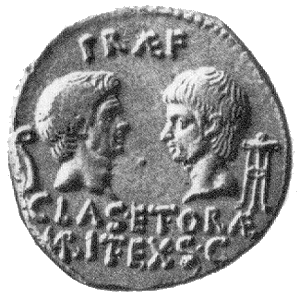 Contents --
Previous Article --
Next Article
Contents --
Previous Article --
Next Article
Sextus Pompey was the son of Pompey the Great. Both he and his father were staunch supporters of the old Roman Republic and bitter enemies of the First Triumvirate. They especially hated Julius Caesar. They formed the Pompeian faction or party and fought several battles against Caesar, whom they believed was trying to destroy the Republic and set up a monarchy.
After the defeat of his father at the Battle of Pharsalus n 48 B. C., Sextus Pompey escaped with some ships into the Western Mediterranean. Later, he joined up with some of Caesar's old enemies which included Sextus' own brother Gnaeus. Labienus and Varus also joined them. These men kept the Pompeian party alive a few years longer. Again, they fought Caesar in Spain and Sextus escaped, leaving his companions behind to face death in battle or execution after the battle.
In 44 B. C., Julius Caesar was murdered in the Forum by the two Republican leaders Brutus and Cassius. For a brief period of time, the Senate gained power during the onset of the struggle between Antony and Octavian, and Sextus Pompey's status changed from that of a hunted outlaw to a naval commander with a commission from the Senate.
This status did not last more than a few months, though. After Octavian occupied Rome in August, 43 B. C., he forced the Senate to issue an order forming a special court to try those who had opposed Caesar on treason charges. Sextus Pompey was again outlawed, but this time he was left with a considerable fleet. It must be remembered that the legions were often paid out of their commanders' own pockets during Republican times, whereas armies of our own day are paid from the government treasury. Roman legions and naval fleets often pledged their loyalty to the man who paid them and whom they believed would keep the power to continue to pay them in the future.
Sextus Pompey now controlled the central Mediterranean, including the islands of Sicily and Sardinia. During the ongoing power struggle between Caesarians, Republicans, Senate, Antony, and Octavian, treaties were made and broken. Sextus was briefly allied with Antony and Octavian by a treaty in 39 B. C., which was soon broken. These were treacherous times and closest friends could become bitter enemies on a moment's notice when an opportunity to increase one's power came along.
In 36 B. C., luck ran out for Sextus Pompey. He still controlled Sicily, but had lost and regained Sardinia to Octavian several times. The combined forces of Lepidus and Octavian attacked him on land and Agrippa, Octavian's faithful friend and able general defeated Sextus at sea and destroyed his fleet. Sextus Pompey fled to Asia, where he was captured and killed by Marc Antony's troops two years later.
Go to next article on Julius Caesar
Go back to previous article on Pompey the Great